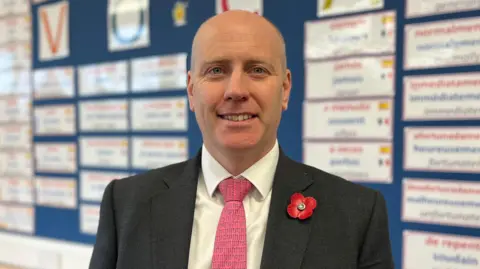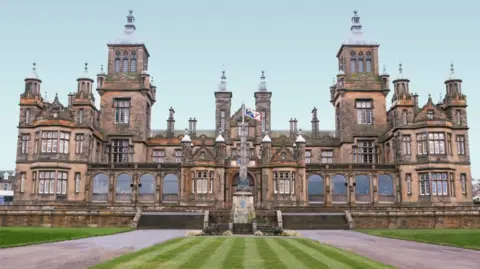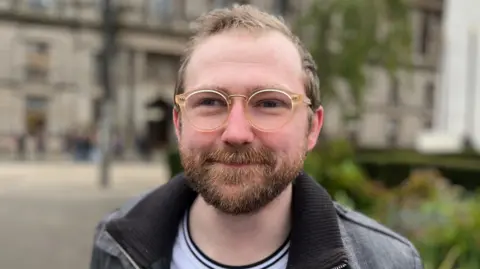VAT change is existential threat to private schools - head teacher
 BBC
BBCThe head teacher of one of Edinburgh's biggest private schools has labelled the UK government's plans to levy VAT on school fees an "ideological" policy that is an existential threat for some schools in the sector.
Anthony Simpson told BBC Scotland News there is "absolute fear" from parents about fee increases once the changes take effect next year.
Chancellor Rachel Reeves is expected to outline the plans in her budget on Wednesday.
The UK government has said that the policy will raise more money for education "so every child gets the best start in life."
As principal of Erskine Stewart’s Melville School (ESMS), Anthony Simpson oversees both the Mary Erskine school for girls and Stewart's Melville College for boys.
When it comes to schools he's seen it all - from teaching maths in boarding schools, to running inner city comprehensives in England.
But he’s deeply concerned about looming VAT changes.
Trying to help society
The school head warns that he’s already detecting a drop off in students starting at his schools, and prospective pupils are now heading towards a state sector where "there aren't any spaces."
Sitting in an empty language class at one of the school’s campuses, he tells me "it's not even VAT, it’s the fear of VAT being imposed that's been the impact on us so far."
ESMS are trying to keep future fees down by merging the girls and boys schools in 2026, but he believes that other independent schools will have to close as a result of the policy.
VAT is a tax of 20% included on most goods and services we purchase. It makes up a significant chunk of the UK government’s revenues.
But Anthony Simpson bristles at the idea of education facing this tax.
"I’ve never thought of what I’m doing as a product. I've thought of it as trying to help society."
 Google
GoogleCity of Edinburgh council contests the suggestion that there is no space for pupils in the authority's state schools.
It says over 9,300 nursery, primary and secondary pupils living in Edinburgh attend private or independent schools.
A spokesperson said: "Our latest projections show we have capacity for a further 12,700 pupils in our schools, but we’ll continue to keep this under review.”
The Institute for Fiscal Studies (IFS) thinktank believes the VAT policy could raise around £1.5bn. UK ministers want to use this revenue to fund extra teachers in England.
Education is devolved, so this would trigger extra money for the Scottish government to spend.
But is this a policy that will lead to a significant drop off in pupils attending private school? The IFS doesn’t think so.
They’ve previously said that three quarters of children at private school come from families in the wealthiest 30% of households.
The thinktank predicts a reduction of somewhere between 3% and 7% as a result of the UK government’s VAT change.
Regardless of the numbers, it still doesn’t sit right for Anthony Simpson.
"We're still fundamentally dealing with children, and we’re still fundamentally dealing with parents who are doing all they can to do the best for their child. It's a tax on those people."
And there are plenty of parents who agree.
Money can't be spent twice
Jane Gilchrist has two daughters attending a private school in Edinburgh. They were originally at a state primary, but she chose to make a switch after both showed signs of dyslexia.
More support was then on hand - a class size of 31 in the state sector became a class size of 12.
She's somewhat conflicted on the issue of school fees. She comes from a "left-wing family" and says there are "valid arguments" that private education should face VAT.
She acknowledges that she's in a privileged position to be able to choose to pay for her daughters' education.
But Jane also pushes back against the idea that parents who opt for private education have "infinite" income and can automatically absorb increased costs.
Her family’s now facing around £8,000 extra a year in fees.
Her two daughters are taking their GCSEs over the next 18 months, which is an added complication - they've not studied the curriculum for the National 5s they'd be sitting if they moved to the state sector.
She says she'll find the money. But spending will have to be cut on other outgoings. She argues that this means the Treasury lose out on VAT elsewhere. "The money can't be spent twice", she explains.
Jane would like to see the VAT introduction tapered to make it easier for families to "absorb the change", rather than introduced in the middle of the school year.
But there are those who think this is a sensible policy - one that principally sees wealthier families pay more in order to help fund education for all.

Barry Black is an education researcher at the University of Glasgow. He's also a member of the Labour Party.
He's supportive of the change, saying that there's a “desperate need” for more resources in state education.
He'd like to see any money raised used to protect teacher numbers and ensure that there's sufficient support for pupils with additional needs.
For him, it's a tweak to the tax system which would see the most affluent families funding "a more equitable education system for all."
They may provide education, but he says that private schools are "businesses who are protecting their bottom line", and he believes the time has come for them to face a similar tax regime to other firms.
It’s a sentiment largely shared by the UK government, who have said that “ending tax breaks on private schools will raise revenue” that can ensure that “every child gets the best start in life.”
Polls have previously suggested it’s – broadly speaking – quite a popular policy.
But for some parents, and teachers, it’s one that will result in a significant – and sudden – rise in costs.
